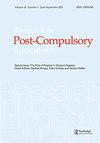Breaking through the fear: exploring the mathematical resilience toolkit with anxious FE students
IF 0.9
Q3 EDUCATION & EDUCATIONAL RESEARCH
引用次数: 0
Abstract
ABSTRACT Approximately one in three people worldwide suffers from mathematics anxiety, with scholarly literature demonstrating that it has significant consequences for both individuals and wider society. While underlying related concepts, such as self-efficacy and emotional regulation, have been studied, there has been less research into accessible, practical approaches that teachers, support staff, carers and learners can use to overcome emotional barriers to learning mathematics. However, one exception is the Mathematical Resilience Toolkit by Johnston-Wilder et al. This paper reviews the research underpinning the Mathematical Resilience Toolkit, introduces the concept of psychological safety, and presents and evaluates the results of a small-scale study. The Toolkit was used with eight mature GCSE mathematics learners in a further education college. In this exploratory study, data were collected from interviews and analysed using thematic analysis. The key themes that emerged highlight the importance of addressing emotional aspects of learning mathematics in the classroom for those returning to mathematics from adverse prior experiences. All participants rated the Mathematical Resilience Toolkit as ‘extremely useful’ and would advise using it as a practical strategy for any adult with anxiety in mathematics learning. This approach warrants further research to establish its efficacy in different contexts.突破恐惧:与焦虑的财经学生一起探索数学弹性工具包
全世界大约有三分之一的人患有数学焦虑症,学术文献表明,它对个人和更广泛的社会都有重大影响。虽然对自我效能感和情绪调节等潜在的相关概念进行了研究,但对教师、辅助人员、护理人员和学习者可以用来克服学习数学的情感障碍的可行、实用方法的研究较少。然而,有一个例外是Johnston-Wilder等人的数学弹性工具包。本文回顾了数学弹性工具箱的研究基础,介绍了心理安全的概念,并对一项小规模研究的结果进行了介绍和评价。该工具包在一所继续教育学院的8名成熟的GCSE数学学习者中使用。在这项探索性研究中,数据收集自访谈,并使用专题分析进行分析。出现的关键主题强调了在课堂上解决情感方面学习数学对于那些从不利的先前经验中回归数学的重要性。所有参与者都认为数学弹性工具包“非常有用”,并建议将其作为任何在数学学习中感到焦虑的成年人的实用策略。这种方法值得进一步研究,以确定其在不同背景下的有效性。
本文章由计算机程序翻译,如有差异,请以英文原文为准。
求助全文
约1分钟内获得全文
求助全文
来源期刊

Research in Post-Compulsory Education
EDUCATION & EDUCATIONAL RESEARCH-
CiteScore
1.30
自引率
14.30%
发文量
31
期刊介绍:
Throughout the world, there is a growing awareness of the significance of vocational and post-compulsory education and training systems. The majority of countries are working hard to develop their provision, recognising the importance of post-compulsory education in providing educated and skilled people in sufficient numbers at appropriate levels to assist economic and social development. Research in Post-Compulsory Education, sponsored by the United Kingdom"s Further Education Research Association (FERA), recognises the need for more international research and analysis and the generation of relevant theory in order to identify policy needs and trends as well as priorities in this growing area.
 求助内容:
求助内容: 应助结果提醒方式:
应助结果提醒方式:


